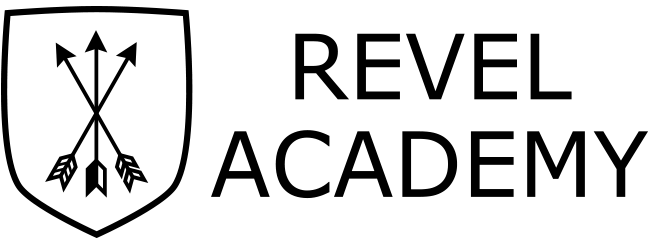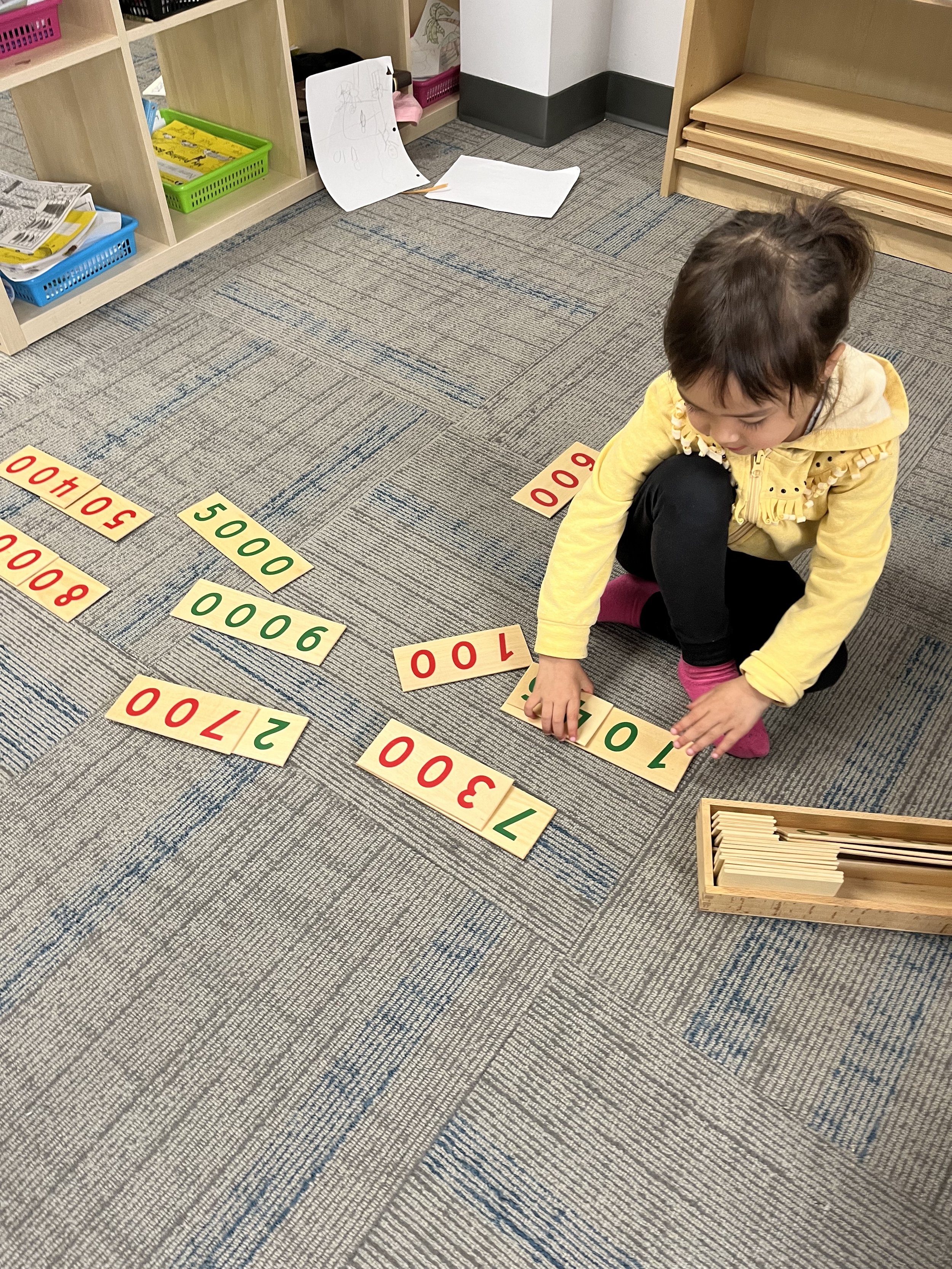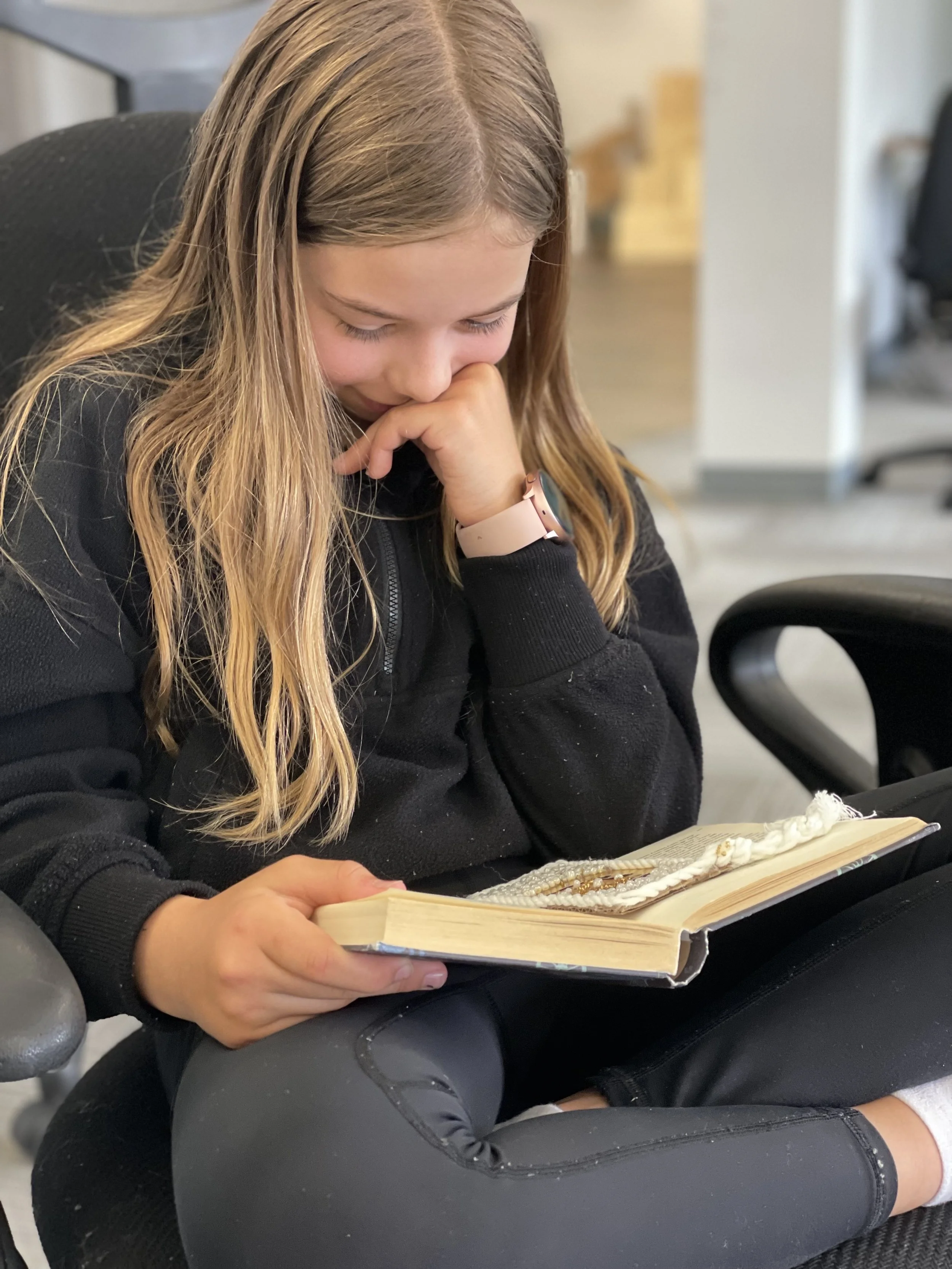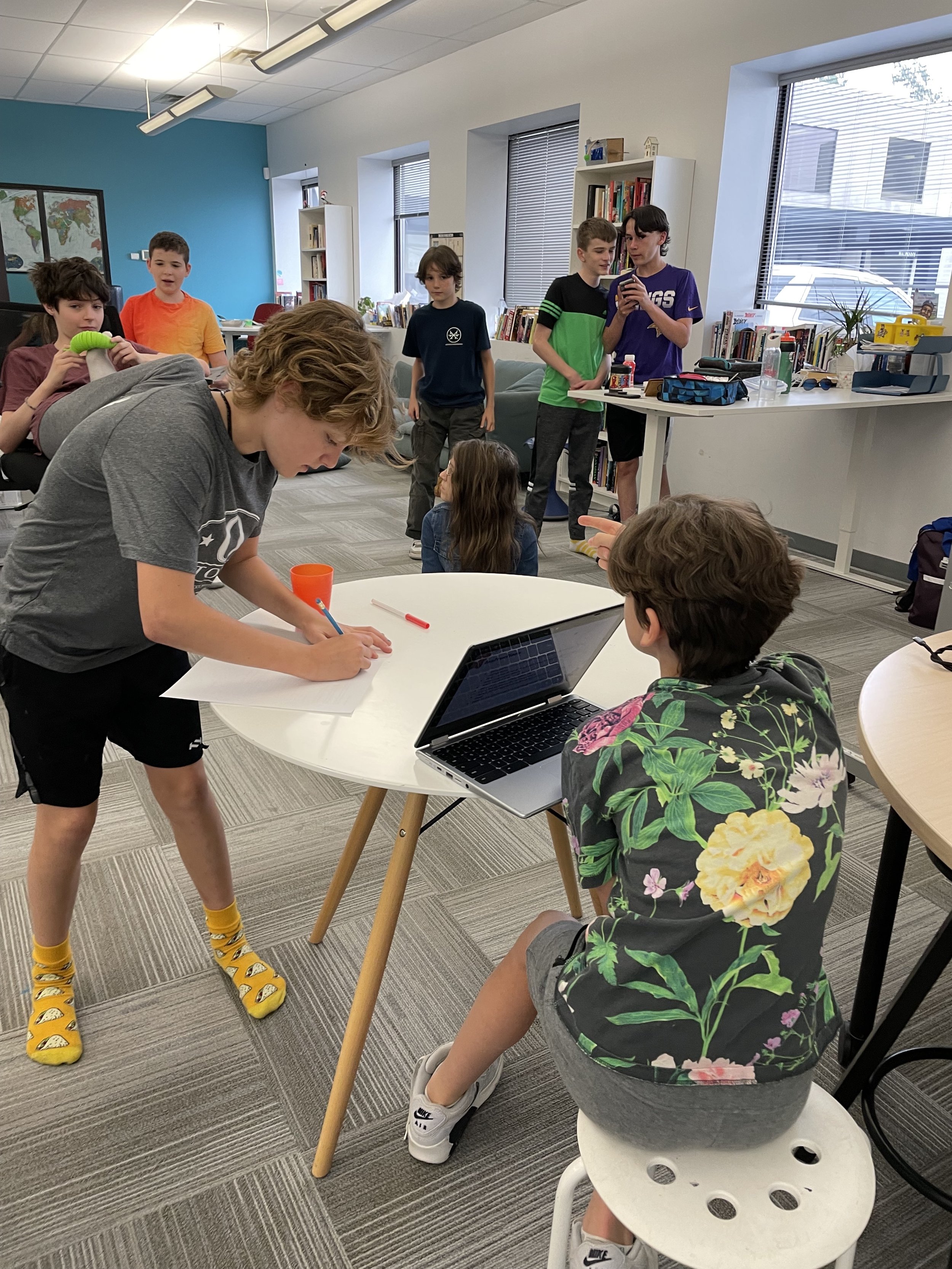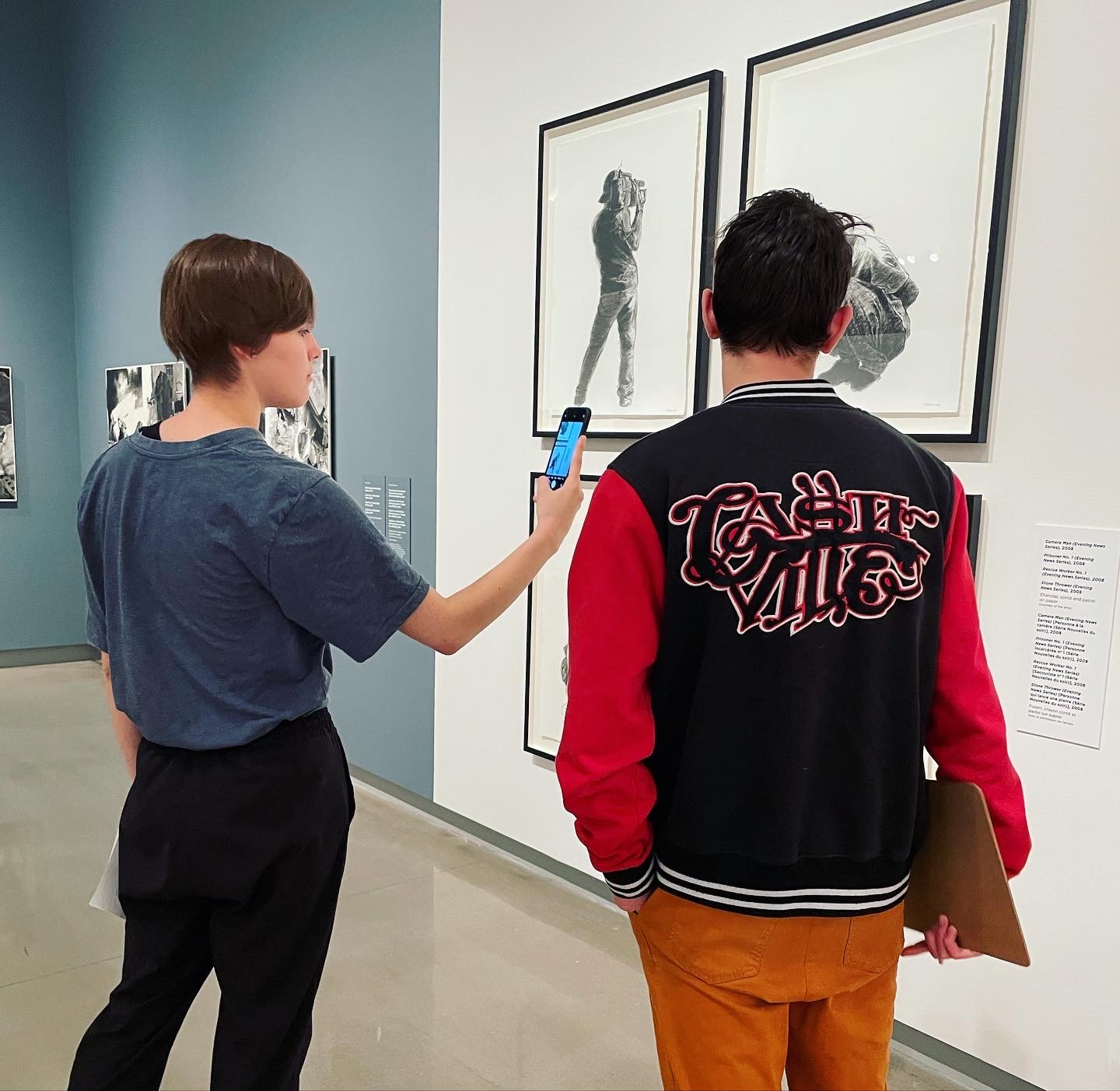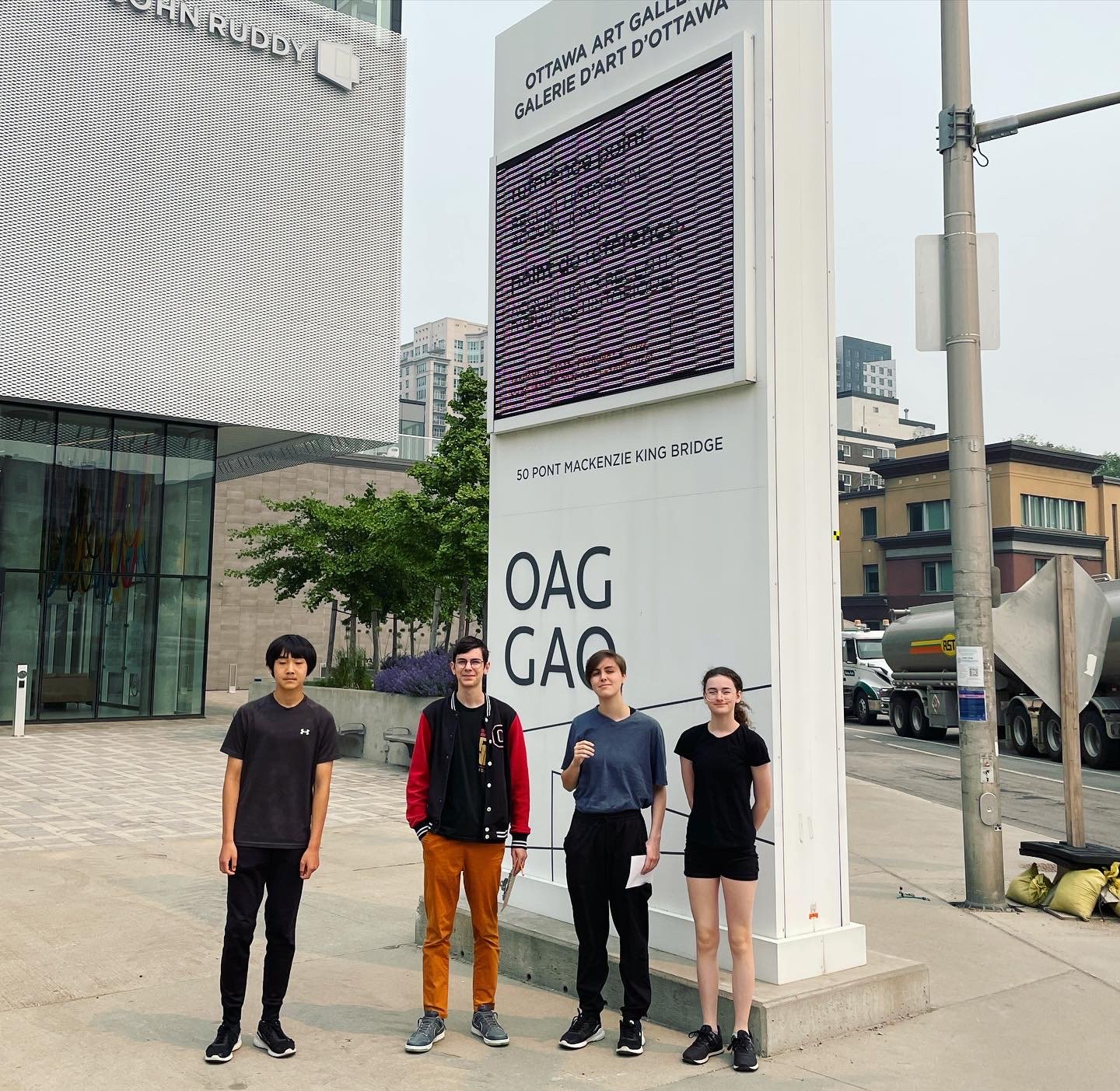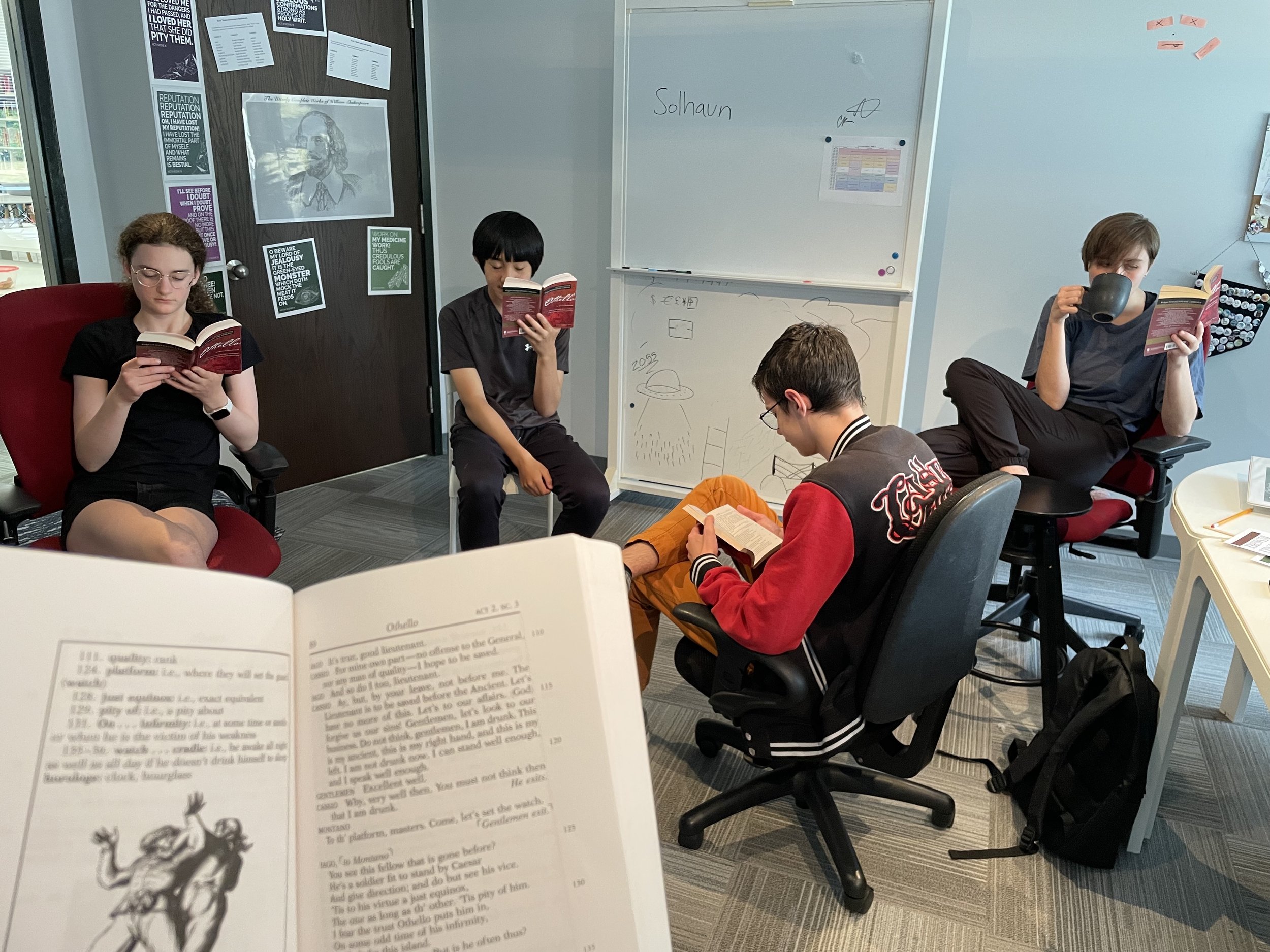Revel Recap: June 5 - 9, 2023
Spark Studio
Mindfulness
Two Sparks created and led a mindfulness activity one day this week, and they chose to do yoga with calming music. They did an excellent job and were excited to take on this leadership role for the session. With our Quest connected to Survivor, the Sparks used their whiteboards to draw pictures based on various scenarios the Guide presented. For example, "draw a picture of items you would pack if you were stranded on an island for 21 days." We also played Nature BINGO. To "win," you had to have a full card and shout BINGO. During our time playing, Sparks shared times they went camping in a trailer or tent. Many seemed super excited about their upcoming camping trips to roast marshmallows. The Sparks continued to write in their gratitude journal on Friday and peacefully colour.
Quest
Quest was full of activities and collaboration with the Discovery Studio once again! The Rebels got back into their teams to achieve new skills when foraging. Inspired by Les Stroud's Wild Harvest series on YouTube, the teams prepared to understand food safety and learn to identify wild, edible species. The learners compared the differences between safe and unsafe berries based on pictures provided to them. We spoke about ways to monitor your safety before eating a berry you may come across. The steps to follow are; rubbing the berry or leaf on the skin, then rubbing around the mouth and chin. After roughly 10 minutes without a reaction, your next step is to chew in your mouth and spit it out after a few seconds. If you continue to have no response, you know it's safe to eat. We observed that berries with three leaves surrounding them are unsafe, as are berries with a white texture on the inside. Yellow berries are dangerous, and it's a 50/50 chance that the red berry you choose is either poisonous or not. Teams worked together to create forage cards with essential details about edible Ontario species - the name of the species, where and when to harvest them, and key facts and cautions. On Tuesday, we focused specifically on poison ivy. With lots of camping and cottage weekends happening during the summer, the Spark's learned, "Leaves of three, let it be." We talked about the importance of washing our hands after interacting with the leaves and always being mindful of our surroundings. The learners then watched a video called, Leave Poison Ivy Alone, which taught us about allergens and how our bodies can get confused and think their dangerous and start fighting.
You should know how to start a fire when living in survival mode. The Sparks can tell you a list of ideas why you may use a fire—for example, cooking food. On Wednesday, we continued our focus on food based around the fire. We discussed fire safety and the materials you would use to start a fire. After a great discussion, the Sparks branched off into their groups to role-play what they would do to start a fire. The Guides offered feedback and asked questions during their presentation.
We journeyed to the Discovery studio on Thursday to link up with our teams. Groups had to indicate whether different plants were safe or unsafe. If items brought back were considered dangerous, points were deducted from their final team score. The last challenge was to hang a bucket over a stick with a knot secured enough to stay attached. Next week we are focusing on shelter!
Math
After introducing the term "sum," the learners were put into small groups to complete a booklet comprised of many different equations. With the help of linking cubes, the teams could answer each one as they built the sum! This week, many Sparks have been working on the addition board and the counting chains for skip counting, while those working on their Singapore math books made significant progress!
Storytelling Workshop
Roll a story! The Sparks worked in groups and had to roll a die to find out who their character would be, where the setting would take place, and what the problem would be. Once they figured out these three aspects of their story, they worked together to write their tale. At the end of the workshop, we read everyone's stories. Many had princesses and lions and time spent in the galaxy. The Sparks have wonderful imaginations, and their stories made all who heard them smile and laugh!
Geography
We are Asia, Africa, North and South America, Antarctica, Europe and finally, Australia. The Sparks tuned into the continent song by Hopscotch and sang loud and proud! We worked on labelling and colouring the continents as a group before taking turns to say the continent and the colour that represents them on the map we use in the studio. We can't wait to focus on more fun facts about each continent.
French
On Monday, we practiced our clothing vocabulary by completing a clothesline craft, and on Tuesday, we played a game of « jean dit » in the gym to review our colours, directions and clothes. We continued our study of clothing on Wednesday when we coloured paper dolls and practiced naming each clothing item. Lastly, we played a fun card game on Thursday to review our fruits and vegetables!
Additional Highlights
This week we moved some of the plants we have been growing inside to our outdoor planter. We also planted some flowers in the garden bed and are excited to watch everything grow! On Monday, we enjoyed our first Mystery Reader of the week. They came all the way from the Discovery Studio, and their Fun Facts immediately alerted their sibling!
The Sparks spent outdoor time exploring the land surrounding us. A scavenger hunt occurred, and the learners had to find something that started with each letter in the alphabet, writing either the word or drawing a picture. Some Sparks even used their imagination to think of things they would see if they were in the wilderness on a camping trip. The Sparks played Berry Musical Chairs to end our day on Monday. The Guides designed a circle outside with four different chalked-coloured dots. Each colour dot represented a different number based on being poisonous or not. It was a fun game to reflect on the safety of berries and plants!
Our Save Fred activity caused quite the excitement in the studio this week! Fred is a worm who can't swim, and his boat flipped while out on his boat ride. Fred's life jacket got stuck under the boat, and he ended up on top of his boat. Poor Fred needed the Sparks' help to save him. The challenge was to use paper clips without having them fall into the water. The Sparks would flip the boat over, get the life jacket, and place Fred into the life jacket inside the vessel. Of course, in the end, the Sparks enjoyed some gummy worms to celebrate their success!
On Wednesday, the Sparks played Don't Forget the Lyrics. The majority sang the songs and were able to finish the lyrics from the Disney movie! Rock on, Sparks! On Thursday, the Guides brought back a game they enjoyed playing as kids, Heads Up, Seven Up. The Sparks wanted to play past 4 o'clock, but we had to remind them that their stuffies needed to be tucked in for the night. The Stuffie Sleepover was a blast for the learners! Their stuffies baked them muffins, drew portraits, and even visited the library. The learners are hoping this will happen again next year!
We celebrated a special birthday in the studio on Friday, and many learners were excited to continue the party after school! To end the week, the Sparks met our new caterpillar friends. We will watch our caterpillars turn into butterflies and are excited to see the process and outcome.
Discovery Studio
Mindfulness
This Monday's mantra was: I am wild and free! The Rebels coloured some fantastic geometric animals and shared which animals they chose and what makes them wild and free. On Tuesday morning, the Rebels had a Choose Your Own Adventure day: some decided on colouring, others picked puzzles, and others tried mindful breathing. On Wednesday and Thursday, the Rebels tried a Canadian map colouring challenge where they had to label all of the provinces and territories! Friday morning, the Rebels played "Shake It Off" on the Boomwhackers.
Launches
Monday's pre-launch equipped the Rebels for this week's headphone experiment. The Rebels wanted to focus on working together more this session and chose a headphone experiment to help focus the studio leadership back on them, not the guides. As such, each Discovery Guide wore headphones twice this week, showing they were offline, in observation mode, and unavailable for questions. Monday's Rebel-led launch was a team challenge where Rebels tried not to laugh while watching funny animal videos. Tuesday's launch equipped the Guides and Rebels with feedback and a few more strategies for the headphone experiment. Wednesday's Rebel-led launch was an Escape Room-style Survival Spelling challenge! Thursday morning, the Rebels reviewed a conversation strategy to help with civility when giving tough-minded feedback. Friday was a special launch with the Sparks to see and hear about all the fun that their stuffed animals had during the Revel Stuffie Sleepover Party!
French
The Rebels are highly motivated to create/reinvent board games in French such as Monopoly, Loup Garou, and chess. This week, they were able to finish their game boards!
We transplanted our seedlings for our French gardening workshop and reseeded those that didn't survive.
Reader/Writer
This week in Reader Writer, Rebels read and discussed Donn Fendler's famous adventure in the mountains of Maine. Rebels were shocked at Donn's survival story, especially since he made the nine-day trek with no shoes due to inflammation! We discussed how feelings of getting lost trigger our amygdala and feelings of nervousness/anxiety and how those feelings can affect our decisions in those situations. Does being able to stay calm help with decision-making? How does Donn's story relate to grit and perseverance? What are some environmental risks unique to mountains? Rebels then broke off into their Survival Handbook groups and began their rough drafts of lists of gear and equipment and step-by-step instructions for building a fire, collecting water, building shelter, and what should be in a First Aid kit tailored explicitly for their extreme survival location.
Math Lab
This week's challenge built on the multiplicative reasoning from the last lab, but instead of a Ferris wheel context, the Rebels were exploring the mass production of the infamous glazed donut made by the Krispy Kreme franchise! After watching a short clip from an episode of Fast Food Mania, the Rebels noticed and wondered about an oversized donut box. They practiced estimating using multi-digit whole numbers, and we revisited the concept of revising our estimates to be "riskier" as we gained new information. The focus strategy was to use arrays as a model to explore the link between multiplication and division while trying to determine how many donuts were in the giant box. Some Rebels solved the problem by physically building an array using Base Ten blocks, others created representations of this model, and some tried using a multiplication algorithm.
Civilizations
This week the Rebels continued to work on specific goals towards their collective museum project: we had some making 3D models of longships, plasticine replicas of famous buildings such as the Hagia Sophia, diagrams of significant inventions like the Printing Press and many worked on writing information in their own words and citing sources used.
Physical Development
While we had to stay inside due to the poor air quality, we had so much fun playing dodgeball and Dragon Eggs on Monday. On Wednesday, the Rebels gathered inside with their yoga mats to run some Go Noodle challenges!
Quest
Last week, all Survivor Teams completed the Collect and Test Water Challenge, earning their WATER badge! This week, we moved on to another critical aspect of survival: FOOD. On Monday, Discovery met with the Sparks and began thinking about how to identify wild, edible species, forage best, and stay safe while doing it. Inspired by Les Stroud's Wild Harvest series on YouTube, the Rebels started creating forage cards with essential details about edible Ontario species - the name of the species, where and when to harvest them, and key facts and cautions. For example, it is safe to eat raw red clovers, but it is not safe to eat raw morel mushrooms. How could you identify these, and once done, how could you harvest them sustainably? Tuesday's theme was edible insects! Rebels looked at this through different lenses, like how eating insects could reduce the water and space required for more traditional North American agriculture and what nutrients and minerals "bugs" contain that would help them survive in the wilderness without food! On Wednesday, they continued developing their forage and harvest cards and practiced tying different knots. Thursday's Survivor game with the Sparks brought everything together: the teams had to collect as much food as possible and safely sort their forage into safe, risky or unsafe using their field notes from the week. Then, they had to use their knot-typing skills to effectively suspend their haul in a bucket to keep it away from other animals! Well done, Rebels!
Additional Highlights
We have a phenomenal parent community who organized Revel's very first Stuffie Sleepover this week! Rebels walked in Friday morning to tuckered stuffies napping in the tent room, and some who had escaped and fallen asleep around the studios. They made muffins, created portraits of their Rebel, played in the gym and had a read-a-thon in the library! Thank you!
Exploration Studio
Mindfulness
After introducing ourselves to a visiting learner, we used a Kahoot to discuss mindfulness and the effects of stress, stopping to discuss different stress-busting strategies! We then talked about how if we are feeling blocked or behind, the important thing is to know that it's not too late. We also watched a quick video with tips for overcoming procrastination, chunking, setting goals, and developing habits.
Tuesday's yoga flow included three moves to stretch out and relax the spine; seated forward fold, standing forward fold and rolling up to mountain pose. We then celebrated Pride and Indigenous History Month with a few trivia games.
Wednesday, we listened to a sitting meditation and then discussed the results of our Civ assignment, where we asked various adults where they would live if they couldn't live in Canada. Many of those we asked had follow-up questions, such as at what point of life they were in. We discussed the various reasons people chose the countries they did, including economics, politics, and climate. After Thursday's yoga, we discussed the government's primary purpose. After listening to the group's insights, we learned what many philosophers have written about government. Rebels then took the rest of the Launch period to answer five core questions about the government they are creating. How do leaders become leaders? What kinds of power do leaders have? What types of power do the people have? How are decisions made in this kind of government? How is money raised to pay the bills? We continued to ponder and answer the questions during our Civ course later in the day.
Rebels played chess, worked on their roller coaster, crocheted, and folded origami while listening to calming music Friday morning. Our Rebel-led Current Events team then taught us about the colugo, updated us on the current forest fire situation, and this week's sports highlights.
Quest
Rebels kicked off their Quest Takeover workshops this week! Each workshop was completely designed and run by Exploration Rebels, for Exploration Rebels, hoping to grow their curiosity into potential Quest theme nominations for next school year. This week we had paper airplane designs and a discussion on studying the science of flight more in-depth next year. Rebels participated in a design challenge to build a paper airplane with a set number of materials and a time limit, eventually competing against each other on Carlington Hill to see whose design would fly the farthest. Due to absences, Ms. Jenna jumped back in to run a workshop on strengthening Launches, linking Socratic questions, inspirational videos and images that relate to a more significant overarching theme that we could build a complete Quest off of. We returned to the Rebel-Led Workshops with the Great Revel Baking Show on Wednesday! Rebels participated in a baking competition to test their measurement skills, knowledge of common baking ingredients, following instructions, and working under tight time constraints. Up next week, we have finger-knitting, meal-prepping and nutrition workshops!
Math Lab
The Rebels regrouped based on their mathematical interests from last week and met up to lock in a specific inquiry question and final project format for their learning activity. They could choose anything from creating their own three-act task to making a podcast, newscast, instruction manual or 3D model. Over the next couple of weeks, they will develop content related to their inquiry and create a product that clarifies their learning on that skill or topic. For example, one group wants to use hands-on materials and better understand volume, so they plan to design a mini 3D escape room. Another team wants to explore how to solve powers and are creating a board game for Rebels to play!
Rules without Rulers
Rebels brainstormed the three elements their IDEAL government would need to have as they began developing their own system. The catch was that they would have to recruit as many people as possible for their government and justify the expense of living there. They will have to make it enticing enough for someone to pick up their things, move, and abandon their current city, country, etc.
To begin, they created three slides, one that defined the goal and guiding dream for their government. Basically, what drives their vision for a better world? On slide 2, they defined their government's value proposition: What sets you apart from other governments? And lastly, on slide three, they expressed their ideal citizen. What type of person would benefit most from living in your country, and what are their fundamental values?
French
This week, we continued to learn about some important texts from French culture. On Monday, we read an extract from Le Petit Prince, and on Wednesday, we listened to a video from Astérix et Cléopâtre (Asterix and Cleopatra: Mission Cleopatra). Learners then answered comprehension questions based on the text and the video.
For our woodworking workshop, we measured our wood and started sawing! The projects are coming along nicely!
Apprenticeship
This week our learners worked to complete their research on at least one of the apprenticeships they are passionate about landing. They searched for the name and contact information of the person making hiring decisions, what the company values, and clarified what the learner could contribute to the organization. With that information gathered and examples of excellence to model theirs after, they began writing a compelling email pitch. We learned that the first goal is to get someone to open their email, which means the subject line is essential. We also need to convince the person to read past the first line and finally get them to agree to a phone call or meeting. Asking for an apprenticeship in an email may feel less scary, but it is almost certain to fail. Moving step by step takes courage but gives us a far better chance of succeeding – and not spending time on apprenticeships that will not happen.
Additional Highlights
To help keep intentionality high as we head into the end of the year, the Exploration learners have chosen a reward for completing a challenge each week. This week Rebels who earned Fun Friday by achieving their core skills goals were treated with ice cream sundaes!
Launchpad
Modern Art History
Have you ever seen a painting or read a story that seems to stretch your perception of reality? Does it feel fantastical, like a dream? Like something that could only happen in a parallel universe? Welcome to Surrealism! Although some may think Surrealism is just another art form, it's a cultural movement expressed through art, literature, and even politics. WWI profoundly affected Europe, and many people believed that the conflict resulted from excessive rational thought and the materialistic values of the middle and upper classes. Artists of this belief were known as Dadaists, and they embraced chaos and the irrational. After reading more about the Surrealist Manifestos by André Breton in 1924 and 1929, we turned to the art of René Magritte and Max Ernst. Learners then picked 2-3 surrealist paintings they liked and explained what they appreciated and what the symbols in the piece meant to them.
The rest of Monday's Quest period was spent studying Salvador Dali, probably the most well-known Surrealist artist in the world, one of the original influencers known for his work and eccentric personality. After viewing a series of Dali's paintings and reading a series of interesting facts, Rebels were challenged to take a photo of themselves imitating one of Salvador Dali's famous expressions.
On Tuesday, learners took a field trip to the downtown Ottawa Art Gallery. We visited each floor with every learner choosing very different favourites. After our gallery visit, learners posted their favourite piece they viewed along with an analysis that included answers to a series of questions on what they saw (Describe), how the work is organized (Analyze), what is happening (Interpret), and what they thought about the artwork (Judge).
On Wednesday, we focused on the life and works of Picasso and Kahlo. What was so fascinating about Picasso? Was it his variety of styles? Was it the movements he created? Was it his dedication to his craft - the fact that he painted over 50,000 pieces of art? Launchpad Rebels read about Pablo Picasso's early life and his paintings before further researching the five periods of Picasso's work; The Blue Period (1901–1904), The Rose Period (1904–1906), Primitivism (1907–1909), Cubism (1909–1919), and Neoclassicism and Surrealism (1919–1929). After posting three paintings and descriptions from each period, they picked which they felt was the most groundbreaking and their reasoning. The remainder of Wednesday's Quest period focused on Frida Kahlo, one of the most iconic artists of the twentieth and twenty-first centuries. Her paintings remain, to this day, moving and vivid symbols of female and Mexican identity and are among the most popular examples of the surrealist school of painting.
On Thursday, it was time to dive into Contemporary Art! Imagine, for a second, the restraint a wild bird would feel if captured as a fledgling and tethered on a short leash. It would yearn to be free of its confines and dream about the feel of the wind over its wings in the expanse of the wide-open sky. After much time for growth and strain from repeated attempts at breaking free, the tether snaps. Now nothing can hold the bird back from all the possibilities of flight it had yet to realize. The wild bird mirrors, quite closely, the story of how we broke through the confines of traditional art movements to arrive at contemporary art! While it is a challenging movement to define, it has been categorized as any art made in our lifetime, following the modern and postmodern art movements in the late 20th and early 21st centuries. It is defined, in part, by being undefinable. Learners read about the expanding possibilities and exploration of concepts before studying Jeff Koons, Keith Haring, Anish Kapoor, and Banksy's approach and accessibility as purpose.
Rules without Rulers
Rebels brainstormed the three elements their IDEAL government would need to have as they began developing their own system. The catch was that they would have to recruit as many people as possible for their government and justify the expense of living there. They will have to make it enticing enough for someone to pick up their things, move, and abandon their current city, country, etc.
To begin, they created three slides, one that defined the goal and guiding dream for their government. Basically, what drives their vision for a better world? On slide 2, they defined their government's value proposition: What sets you apart from other governments? And lastly, on slide three, they expressed their ideal citizen. What type of person would benefit most from living in your country, and what are their fundamental values?
Othello
We began our week learning about the setting of Othello from Harvard Professor Stephen Greenblatt, who introduced the culture and politics of Venice in Shakespeare's time. We then read Act 2, Scene 1 and discussed the interaction regarding women, debating whether the exchange was playful or more sinister and whether the women are generally offended by Iago. Rebels then took turns directing Iago's soliloquy, thinking about lighting, volume, and stage directions.
On Tuesday, we read Act 2, Scene 2 and then quickly reviewed the plot and timeline for Act 2, Scene 3 before we read it as a group. We then discussed why Iago persuades Roderigo so easily and what more profound point they think Shakespeare is presenting about appearance and reality, truth and deception.
We reviewed the key quotations from Act 2 on Wednesday before mapping out Iago's manipulation. Each learner then came up with a question to ask each of the main characters (Othello, Iago, Desdemona, Roderigo, and Cassio) regarding their motives, feelings, and actions. It was then time for each to take the hot seat and become one of the characters while the other learners asked questions. It was amazing hearing them get into character and answer the way each play member would.
On Thursday, we discussed the need for comic relief in a tragic play and role-played how people commonly sow seeds of doubt. We then continued our dramatic reading of Othello with Act 3, Scenes 1 through 3. Friday, we caught up on our reading analysis activities and discussed whether we find Othello's rapid change from trust in his wife to distrust completely convincing.
Service Project
This week our learners cooked a Greek Butternut Squash Salad with Chicken for the neighbours at Highjinx. It is always a highlight when not only do the teens discover a new recipe they find delicious and want to add to their repertoire, but they can also share a healthy meal with those who are food insecure.
Potential Discussion Ideas or Questions to Ask Your Rebel:
Spark
How can you tell if a berry is poisonous?
What should you do if you touch poison ivy?
Could you show your family how to tie a knot?
French: How do you say « dress » in French? (Robe)
Discovery
What is meant by contamination risk when foraging, and which plants in Ontario are dangerous to touch?
What is a CPR conversation, and how does it help your studio build civility?
French: How are you getting on with making your board game in French? What board game are you making?
Exploration
Which topic did you select for Math Lab, and what are you working on creating for the end-of-session activity?
What power will the leaders in your government have? What powers will your citizens hold?
French: How's your woodworking project coming along?
Launchpad
Is it possible for art to ever not be influenced by current events? Why or why not?
Do you think pain informed Frida Kahlo's art? Would her art have been different had she not suffered so much?
As an artist, to become successful, would you:
Dedicate 100% of your time to improving your craft (your art skills)
Split your time equally between your social media presence and improving your art skills
Why?
What is your prediction for the next act in Othello?
Dates of Interest
Tuesday, June 13th - Launchpad hike at Pink Lake
Tuesday, June 27th - Discovery and Spark Field Trip to Baxter Conservation Area
Wednesday, July 5th (3:00 pm - 5:00 pm) - Full School End of Year Celebration
Thursday, July 6th - Exploration Graduation Ceremony
